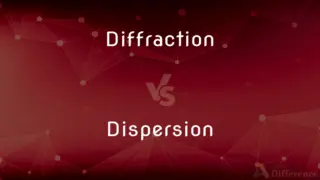Scarce vs. Scarcely — What's the Difference?
By Urooj Arif & Maham Liaqat — Updated on March 29, 2024
"Scarce" is an adjective describing something rare or insufficient in quantity, while "scarcely" is an adverb indicating that something is barely or hardly the case.

Difference Between Scarce and Scarcely
Table of Contents
ADVERTISEMENT
Key Differences
"Scarce" refers to the limited availability or rarity of resources, objects, or conditions, suggesting that there is not enough of something to meet the demand or need. On the other hand, "scarcely" is used to describe the manner in which an action is performed or a condition is met, often implying just barely or almost not at all.
Scarce is often used to describe tangible items or resources, such as food, water, or time, indicating that they are not abundant or readily available. Conversely, scarcely modifies verbs, adjectives, or other adverbs, enhancing the meaning to express a minimal degree or extent of something.
While "scarce" highlights the state of being rare or insufficient, "scarcely" focuses on the extent to which something happens or is true, emphasizing a very limited degree. For example, water can be scarce in a drought-affected region, and a traveler might scarcely find water in such an area.
The use of "scarce" and "scarcely" also differs in sentence structure. "Scarce" is used to describe nouns (e.g., "Scarce resources"), whereas "scarcely" is used with verbs or to modify entire statements (e.g., "He could scarcely believe it").
Both "scarce" and "scarcely" convey notions of insufficiency, but from different grammatical perspectives and with nuances in their meaning and use. "Scarce" focuses on the availability or presence of something, while "scarcely" deals with the degree or manner in which something occurs or is experienced.
ADVERTISEMENT
Comparison Chart
Part of Speech
Adjective
Adverb
Meaning
Describing something rare or insufficient in quantity.
Indicating barely, hardly, or almost not at all.
Usage
Used to describe nouns (e.g., resources, items).
Modifies verbs, adjectives, or adverbs.
Example Sentence
"Clean water is scarce in arid regions."
"We scarcely saw any wildlife on the safari."
Focus
Highlights the state of being rare or insufficient.
Focuses on the extent or degree of an action or condition.
Compare with Definitions
Scarce
Limited in presence or occurrence.
Affordable housing is becoming increasingly scarce.
Scarcely
With little likelihood.
There's scarcely any chance of success.
Scarce
Few and far between.
Scarce moments of peace were cherished during the conflict.
Scarcely
Barely or hardly at all.
He could scarcely believe his eyes.
Scarce
Rare or not readily available.
Scarce supplies made the expedition challenging.
Scarcely
Just a minimal degree.
Scarcely anyone attended the meeting.
Scarce
Insufficient to meet demand.
Jobs were scarce in the small town.
Scarcely
Almost not.
Scarcely had the game started when it began to rain.
Scarce
Hard to find in the desired quantity or quality.
Scarce artifacts are highly valued by collectors.
Scarcely
By a small margin.
They scarcely made it to the airport on time.
Scarce
Insufficient to meet a demand or requirement; short in supply
Fresh vegetables were scarce during the drought.
Scarcely
By a small margin; barely
We scarcely made it in time.
Scarce
Hard to find; absent or rare
Steel pennies are scarce now except in coin shops.
Scarcely
Almost not; hardly
We scarcely ever used the reserve generator.
Scarce
Barely or hardly; scarcely.
Scarcely
Certainly not
They could scarcely complain after such good treatment.
Scarce
Uncommon, rare; difficult to find; insufficient to meet a demand.
Scarcely
(modal) Probably not.
One could scarcely find any trout in the stream without the stocking program.
Scarce
(archaic) Scantily supplied (with); deficient (in); used with of.
Scarcely
(modal) Certainly not.
One could scarcely expect the man to know how to fly a helicopter.
Scarce
Scarcely, only just.
Scarcely
(degree) Hardly: only just; by a small margin.
Scarce
Not plentiful or abundant; in small quantity in proportion to the demand; not easily to be procured; rare; uncommon.
You tell him silver is scarcer now in England, and therefore risen one fifth in value.
The scarcest of all is a Pescennius Niger on a medallion well preserved.
Scarcely
By a small margin;
They could barely hear the speaker
We hardly knew them
Just missed being hit
Had scarcely rung the bell when the door flew open
Would have scarce arrived before she would have found some excuse to leave
Scarce
Scantily supplied (with); deficient (in); - with of.
Scarcely
Almost not;
He hardly ever goes fishing
He was hardly more than sixteen years old
They scarcely ever used the emergency generator
Scarce
Sparing; frugal; parsimonious; stingy.
Scarce
With difficulty; hardly; scantly; barely; but just.
With a scarce well-lighted flame.
The eldest scarcely five year was of age.
Slowly she sails, and scarcely stems the tides.
He had scarcely finished, when the laborer arrived who had been sent for my ransom.
Scarce
Frugally; penuriously.
Scarce
Not enough; hard to find;
Meat was scarce during the war
Scarce
Deficient in quantity or number compared with the demand;
Fresh vegetables were scarce during the drought
Scarce
By a small margin;
They could barely hear the speaker
We hardly knew them
Just missed being hit
Had scarcely rung the bell when the door flew open
Would have scarce arrived before she would have found some excuse to leave
Common Curiosities
What does it mean when resources are described as scarce?
It means that the resources are rare, limited, or not enough to meet the demand.
Can "scarce" and "scarcely" be used interchangeably?
No, they cannot be used interchangeably as "scarce" is an adjective describing rarity or insufficiency, while "scarcely" is an adverb indicating a minimal degree or extent.
Can "scarcely" enhance the meaning of other adverbs?
Yes, "scarcely" can modify other adverbs to emphasize a minimal degree, such as "scarcely ever" meaning almost never.
How does "scarcely" convey a sense of time?
"Scarcely" can convey a sense of immediacy or a very short time, as in "Scarcely had the movie started when the power went out."
Is "scarcely" related to probability?
Yes, when used in contexts implying likelihood, "scarcely" suggests something is almost not likely or possible.
What is an example of a situation where something is scarce?
Clean drinking water can become scarce during a drought.
How does the scarcity of a resource affect its value?
Generally, the scarcer a resource, the higher its value due to increased demand and limited availability.
How is "scarcely" used in a sentence?
"Scarcely" is used as an adverb to indicate that something barely happened or is almost not the case.
What are the implications of scarcity?
Scarcity implies that there are not enough resources or items to satisfy the needs or desires of people, leading to potential competition or rationing.
What does it mean to "scarcely breathe"?
To "scarcely breathe" means to breathe with difficulty or barely at all, often due to shock, exertion, or a tight space.
Share Your Discovery

Previous Comparison
Homoscedasticity vs. Heteroscedasticity
Next Comparison
Diffraction vs. DispersionAuthor Spotlight
Written by
Urooj ArifUrooj is a skilled content writer at Ask Difference, known for her exceptional ability to simplify complex topics into engaging and informative content. With a passion for research and a flair for clear, concise writing, she consistently delivers articles that resonate with our diverse audience.
Co-written by
Maham Liaqat










































